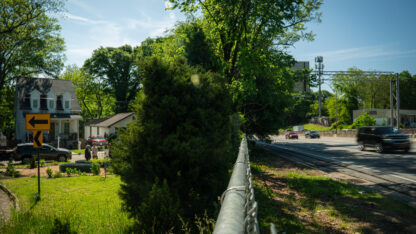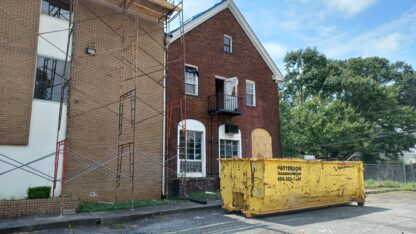Ga. Tech Grad Sews Together Training Program For Liberian Women

When Georgia Tech graduate and Atlantan Archel Bernard moved to Liberia in 2011, she wanted to be the “West African Oprah Winfrey.”
But to be a West African Oprah, she needed to dress like a West African. So she took a sketch of a dress she dreamed up to a Monrovian tailor. When she went to pick up the dress, not only was the tailor wearing her design, but so was another customer.
Later that year, she sold out of her clothes at a shopping party in Atlanta. Friends and family loved the punchy designs — one in particular that Bernard, 27, thought might be “too African” sold out first.
“It encouraged me,” she says. “Maybe I’m on to something and maybe people are really interested in things that we have here.”
Now, Bernard and the employees of The Bombchel Factory have a Kickstarter fund in place to begin their venture into fashion.
Skills for Life
The Bombchel Factory hires Liberian women who have been affected by Ebola or are rape survivors and teaches them how to sew as part of a skills training program. For 12 women, it could mean the difference from barely surviving to thriving in a year.
“I want them to have the opportunity to go out and make their own plan and make their own way,” Bernard says.
The Bombchel Factory, which opened Feb. 13, pays each woman a fair wage for a year while they learn to sew Bernard’s contemporary line of West African clothing. The women are taken on as trainees, and then they graduate to full-time employees once they learn how to sew the entire collection. They also earn a portion of the sales from each garment.
“We’re learning how to sew dresses, scarves and many other things,” Emma Goanue, 47, says. “The plan that she has for us … I am grateful.”
Skirts, blouses, ties and even hoop earrings are produced from stunning, colorful textiles locally sourced in Monrovia. The casual, but modern line is designed for women who want their look to pop even when they’re shopping for tomatoes, Bernard says.
Women at the Bombchel Factory not only learn a trade, but they also attend literacy, business and budgeting classes as well. The end goal, Bernard says, is to give each woman the skills they need to become business owners themselves if they desire.
“When I started, I didn’t know how to do anything like this,” Beatrice Blama, 27, says. “I would like to start my own business.”
That’s exactly what Bernard wants.
“Ideally, I want, in 10 years, to have nothing but competition from our factory,” Bernard says. “I want all of these women to have their own businesses and competing with theirs and mine. That’s what we want — women who can open businesses and really change the economy in Liberia.”
The Ebola Outbreak
It wasn’t until Ebola spread through West Africa that Bernard formulated the plan that would help these Liberian women get back on their feet.
At the time, Bernard and a friend were running a retail shop, Mango Rags, and contracting Liberian tailors to make clothing when Ebola swept through West Africa, killing thousands of people.
Bernard decided to come home to Atlanta during that time, but it tugged at her conscience that her employees and friends were still there and without work.
“People just stopped shopping,” Bernard says. “I packed up the store and sold the clothes in Atlanta to see what could be done.”
Bernard took some time to shadow other boutique owners and manufacturing factories in the U.S. for ideas to make the next step in Liberia once the Ebola outbreak subsided.
Her biggest takeaway was manufacturing. It offered the permanency Bernard was looking for and the ability to help Liberian women learn to sew.
She returned to Liberia, plans in hand, to lay the foundation for women like Blama, who lost her husband to Ebola, to learn a new trade.
“I wanted to start The Bombchel Factory because of women like [Beatrice],” Bernard says. “There are so many people who need a new start, a fresh start, which is what we have the opportunity to do with my store after Ebola ended.”
Bernard didn’t stop there; she also started an internship program with Hope School for the Deaf, which provides academic and skills training to hearing-impaired children in Monrovia.
By September, Bernard wants to bring on 12 more women to learn the business, launch The Bombchel Factory’s retail website and attend New York Fashion Week to debut the company’s spring/summer 2017 collection.
Family Roots
She credits her drive to help these Liberian women to her own heritage, which is Liberian-American.
Her grandfather came to the U.S. from Liberia in the 1950s to attend college at Atlanta University when he met Bernard’s grandmother, who was a student at Clark College. They married and moved back to Liberia until the civil unrest began in the 1980s. Then the family moved back to the U.S.
Her life was so changed by where she had grown up. It deeply impacted her when she found out that a friend, who is the same age, endured a very different experience in Liberia during the civil war, which lasted from 1989 to 1997 and killed about 150,000 people, according to the U.N. The family, Bernard says, had to flee on foot to Guinea to escape the war-torn country.
“I just think about that … what are the odds?” Bernard says. “It could have been me who had to run on foot to Guinea, and then I wouldn’t have had this experience or the opportunity to reach clients in Atlanta. … We’re all women and the only thing that separates us is basically what happened to us during the war and our ancestral background in that way.”
But now when she steps into The Bombchel Factory, she sees women who are “ready to work, learn, help each other, support each other.” And that gives her hope.
“It’s a real testimony of just having faith in that you can do more than what you’re born into,” she says. “I’ve never felt more excited to just praise God. It’s like so many things had to happen for all of us in order to bring us together. … I’m just excited to see where it goes.”
9(MDAxODM0MDY4MDEyMTY4NDA3MzI3YjkzMw004))





